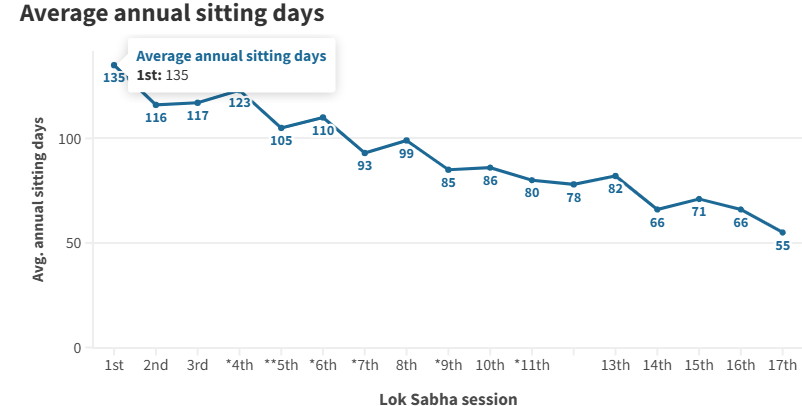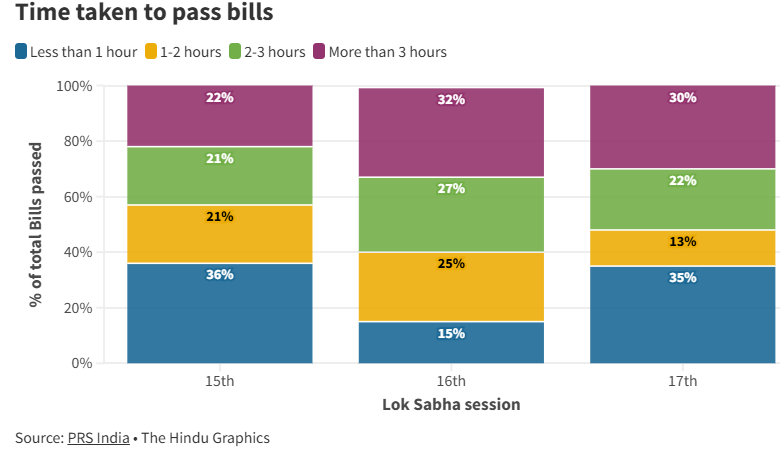Indian Polity
Legislative Productivity in India
- 10 Jul 2025
- 11 min read
For Prelims: Office of Speaker of Lok Sabha, Lok Sabha, Productivity of parliament, Adjournment, Parliamentary Committees, Rajya Sabha
For Mains: Issues Related to Functioning of Parliament & Measures to Improve Productivity of Parliament
Why in News?
Lok Sabha Speaker, while speaking at the National Conference of Urban Local Bodies (ULBs) Chairpersons highlighted the need to enhance legislative productivity and discourse quality.
What is the Status of Legislative Productivity in India?
- About: Legislative Productivity refers to the efficiency and effectiveness with which legislative bodies such as the Parliament and State Legislatures carry out their core functions such as lawmaking, executive oversight, budget approval, and debate on issues of national/public importance.
- Status:
- Number of Sitting Days: Parliament's sitting days have declined from around 135 days/year in the 1st Lok Sabha to just around 55 days/year in the 17th Lok Sabha.
- Length of Each Sitting: Longer sittings are essential for in-depth legislative deliberation. However, in the 2023 Budget Session, Lok Sabha and Rajya Sabha functioned for only 33% and 24% of scheduled time respectively, making it the 6th shortest Budget Session since 1952.

- Number of Members Present: A strong quorum is vital for meaningful debate and informed decision-making. In the 17th Lok Sabha (2019–2024), average MP attendance was 79%, but debate participation remained low, with MPs averaging only 45 debates each.
- Level of Disruption: Frequent disruptions, such as slogan shouting and walkouts, drastically reduce debate time. The 15th Lok Sabha (2009–14) lost over 30% of its scheduled time to disruptions, severely affecting legislative productivity.
- Examination by Parliamentary Committees: In the 17th Lok Sabha, only 10% of Bills were referred to committees, a sharp drop from the 14th LS (60%), 15th (71%), and 16th (25%), with just 14 Bills reviewed. Additionally, increasing party-line divisions within committees in recent years have undermined bipartisan scrutiny, affecting the quality of legislative review.
- Functioning of Debates: Question Hour & Zero Hour, essential tools for executive accountability, remain underutilized or absent. In the 17th Lok Sabha, Question Hour functioned for only 19% of scheduled time in Lok Sabha and 9% in Rajya Sabha.

- Introduction of Private Member Bills: Since Independence, over 300 such Bills have been introduced, but only 14 have been passed, with the last one in 1970.
- Delayed Constitutional Requirements: The Deputy Speaker post under Article 93 has remained vacant throughout the 17th Lok Sabha, despite the constitutional requirement of election “as soon as possible.”
- Decline in Consensus-Driven Lawmaking: The tradition of building consensus between the government and the Opposition has weakened significantly, leading to the passage of key Bills with minimal debate and frequent disruptions.
- The limited use of joint sittings, only 3 times since 1950, highlights the erosion of mechanisms meant to resolve legislative deadlocks.
What are the Key Implications of Lower Productivity of Legislature?
- Oversight Weakening: Fewer sitting days, frequent disruptions, and underutilized Question Hour reduce the legislature’s ability to hold the executive accountable, weakening parliamentary scrutiny and enabling unchecked decision-making.
- Poor-Quality Lawmaking: Bypassing Parliamentary Committees and passing Bills in haste often without debate, compromises the rigour, legality, and effectiveness of legislation, increasing the risk of judicial review and implementation challenges.
- Opposition Marginalisation: Limited time for debates, absence of Private Member Bills, and curbed Opposition participation dilute inclusive lawmaking, hinder consensus-building, and weaken the role of dissent in a democracy.
- Public Trust Erosion: Perceived legislative dysfunction undermines citizen confidence in democratic institutions, leading to political apathy, reduced electoral participation, and erosion of institutional legitimacy.
- Executive Overreach: Reduced legislative engagement enables the executive to bypass the legislature through ordinances, delegated legislation, and executive orders, upsetting the constitutional balance of power and weakening checks and balances.
What Measures Have Been Taken to Improve Legislative Productivity in India?
- Code of Conduct for MPs: A formal code of conduct guides the behavior of Members of Parliament (MPs), aiming to uphold decorum, reduce disruptions, and promote constructive participation in legislative business.
- Adoption of Technology: Parliament has adopted digital tools to enhance legislative efficiency. Live streaming of proceedings has increased public scrutiny, promoting greater accountability and disciplined behavior by MPs.
- Initiatives like e-Vidhan (NeVA) aim to make all State Legislatures paperless, ensuring real-time updates and improved transparency in legislative functioning.
- Strengthening the Committee System: A robust system of parliamentary committees, including Departmentally Related Standing Committees, is used to examine Bills, policies, and executive actions in detail.
- This allows for incorporation of expert input and strengthens the quality and depth of legislative deliberations.
- Disciplinary Mechanisms: To address unruly behavior, Parliament enforces disciplinary actions such as suspension or expulsion of MPs who violate rules. These measures aim to uphold the dignity of the House and ensure orderly functioning.
- Capacity Building for Legislators: Training sessions, workshops, and handbooks conducted by bodies like the Lok Sabha Secretariat, PRS Legislative Research, and NGOs equip Legislators with knowledge of procedures and best practices.
What Steps Can be Taken to Improve the Legislative Productivity in India?
- Institutional Discipline and Regular Functioning: Mandate minimum sitting days for Parliament and publish annual legislative calendars to ensure predictability and time-bound deliberation.
- Adopt Model Rules of Procedure across all tiers to standardize conduct and uphold legislative decorum.
- Committees & Legislative Scrutiny: Empower Standing and Subject Committees at all levels to examine Bills, budgets, and policies thoroughly.
- Make committee referrals mandatory for significant legislation. Institutionalize pre-legislative consultations to incorporate expert and stakeholder input early in the lawmaking process.
- Accountability and Transparency: Monitor and publish attendance, debate participation, and voting records of MPs, use the Right to Information (RTI) Act, 2005 for better accountability.
- Empower Presiding Officers to curb disruptions through disciplinary powers. Mandate live streaming and archiving of proceedings to enhance transparency and public trust.
- Dialogue and Capacity Building: Foster a shift from disruption to dialogue by encouraging consensus-building between the government and opposition.
- Provide training and orientation to first-time representatives to improve legislative quality and informed participation.
- Citizen Engagement and Recognition: Promote youth leadership rooted in integrity and public service. Recognize high-performing legislators through awards, grants, and platforms like the Manesar Conference to share best practices.
- Adopt International Best Practices: Adopt IPU (Inter-Parliamentary Union) standards promoting transparency, inclusivity, and access to legislative information.
- Emulate UK and German models of fixed sitting days and mandatory committee scrutiny.
- Introduce MP/MLA exchange programmes with countries like Canada, Australia, and the UK to share procedural and ethical best practices.
- Encourage benchmarking mechanisms inspired by OECD Parliaments, including public dashboards on legislative performance.
Conclusion
Legislative productivity is crucial for democratic accountability, quality lawmaking, and responsive governance. Despite advances in digital integration and committee reforms, issues like disruptions, low scrutiny, and reduced sittings hamper effectiveness. Strengthening institutional discipline, fostering bipartisan dialogue, and enhancing citizen participation are essential to empower legislatures at all levels for realizing Viksit Bharat @2047.
|
Drishti Mains Question: Analyse the key factors responsible for the decline in legislative productivity in India and propose holistic measures to strengthen it. |
UPSC Civil Services Examination, Previous Year Questions (PYQs)
Prelims
Q. Which of the following is/are the exclusive power(s) of Lok Sabha? (2022)
- To ratify the declaration of Emergency.
- To pass a motion of no-confidence against the Council of Ministers.
- To impeach the President of India.
Select the correct answer using the code given below:
(a) 1 and 2
(b) 2 only
(c) 1 and 3
(d) 3 only
Ans: B
Mains
Q. To what extent, in your view, the Parliament is able to ensure accountability of the executive in India? (2021)






